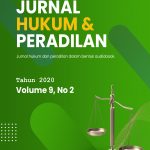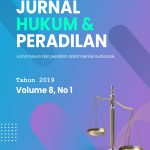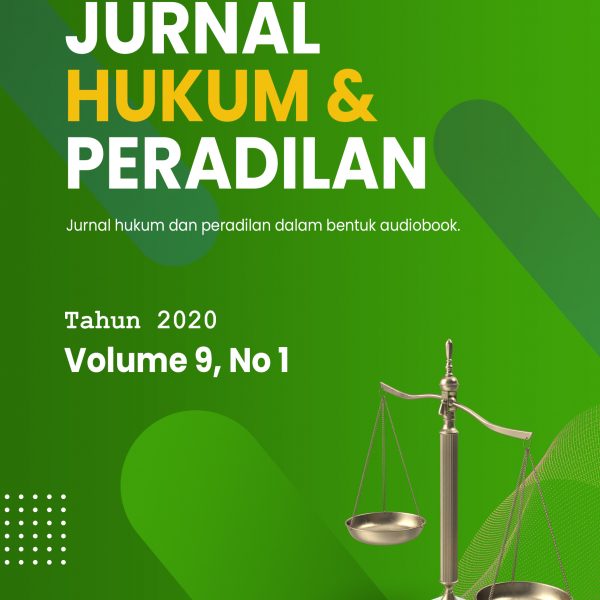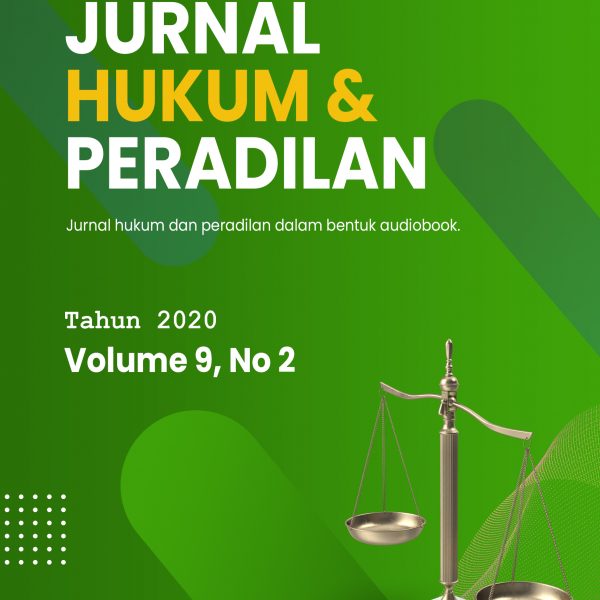
Jurnal Tahun 2020
Volume 9, No 3
Abstract.
This study aims to describe the legal protection in the field of labor in Indonesia for female workers who had experienced harassment in work relationships.
The research method used is normative juridical through statute approach, conceptual approach and case approach Baiq Nuril. The data source is in the form of primary legal materials, namely the Manpower Act, the PPHI Law, the ITE Law, the Criminal Code, the Human Rights Law and the MA Decision No. 574 K / Pid.Sus / 2018, also secondary legal materials in the form of the PKS Draft Bill, books, papers and journals that contain views and doctrines developed in the science of law.
The results of the study showed that the Manpower Act had not yet provided the rights of women workers to protect their morals and decencies, as well as treatment that was in accordance with human dignity and religious values in work relations according to human rights. The status of honorary workers in government agencies became unclear after the enactment of the ASN Law. The UUK and PPHI Law cannot be applied in the case of honorary worker Baiq Nuril, because it does not include the legal subject of employer government agencies. The rights of workers detained during criminal proceedings cannot be prosecuted in the Industrial Relations Court as a manifestation of the presumption of innocence principle. Legal protection for female workers who experience non-verbal sexual harassment is not regulated in the Indonesian Criminal Code or in other criminal laws, so that their human rights cannot be maintained before a criminal court. The PKS Draft Bill has included non-verbal sexual harassment as a form of protection for women, therefore it needs to be authorized by the Parliament immediately.
Abstract.
Street children choose life on the road caused by lack of economic factors, family factors that are not harmonious always fight, children feel stressed so that they have a way to live, and their activities on the streets such as busking, begging, and many other activities. The main objective is to describe advocacy role model non-government organization handling street children dealing with law in Indonesia. The research method used is normative juridical with a descriptive-analytic approach and literature study equipped with primary and secondary data sources. Data collection used observation and analysis of documents. Data analysis uses qualitative analysis methods. This study’s results indicate that street children in Indonesia have a variety of character problems, primarily economic, family, social, and legal issues. Therefore, the role of community and government institutions is needed to provide complete protection to realize human rights. The role of NGOs in advocating for street children in dealing with the law maximized. The productivity of legal aid institutions has resulted in various forms of legal assistance to street children involved in criminal acts; besides, aid is also in developing interests and talents of street children. The condition is that government assistance is needed to provide a particular budget for NGOs so that the process of advocating for street children carried out correctly. An evaluation of the role of NGOs in advocating for street children requires an in-depth study of other aspects.
Abstract.
The banking sector as one of the drivers of the national economy plays an important role in funding a business through bank credit distributing activities. In practice, this banking service raises legal problems, not only banking crimes but also corruption. Supreme Court Decision No. 1812 K / PID.SUS / 2014 on behalf of the Defendant Dian Siswanto, S.E. MM., in the case of a corruption shows this. This paper examines the element of unlawful and abuse of authority in cases of corruption in the banking sector. The research method used is normative law which is prescriptive with a statute approach, a conceptual approach, and a case approach. The results show 2 (two) things, first, that the defendant’s actions met the unlawful element in the act of corruption as charged in the primary indictment. Second, the judge had wrongly in the application of law based on the subsidiary indictment concerning abuse of authority which was not fulfilled. The judge in this case, was not punctilious in digging up legal facts and was not correct in applying the law. Therefore, in the case of deciding a case, if the charges are of subsidiarity, the judge should prove the primary indictment carefully before deciding based on the subsidiary indictment to create justice, benefit and legal certainty in law enforcement in general, and especially for the accused.
Abstract.
Abstract.
Abstract.
Abstract.
The problem of judicial review of regional regulations in the Supreme Court is a serious academic and practical issue that needs to be resolved after the issuance of the decision of the Constitutional Court Number 137 / PUU-XIII / 2015. There are two problems in this paper, first, the legal implications of the Constitutional Court Decision Number 137 / PUU-XIII / 2015 on institutional and legal procedures for judicial review of regional regulations in the Supreme Court, secondly, how is the concept of the Supreme Court judicial review carried out through renewal of procedural law Trial Judicial Review in the Supreme Court? Based on the discussion above, we can conclude two things, first, the legal implications of the Constitutional Court Decision Number 137 / PUU-XIII / 2015 on the institutional and legal procedures for judicial review of regional regulations in the Supreme Court are the stronger and increasing authority of judicial review in Supreme Court. This decision ended the dualism of review of local regulations from judicial review by the Supreme Court and executive review of regional regulations by the Ministry of Home Affairs to only a judicial review by the Supreme Court, also potentially increasing the number of cases of judicial review in the Supreme Court. Second, the concept of the implementation of a judicial review by the Supreme Court is carried out through legal renewal of the judicial review proceedings in the Supreme Court by including several important substances, related to hearings that are open to the public, the existence of a preliminary examination, hearing, verdict and decision making that are more open and fair.
Abstract.
The requirements of domicile (the same domicile of both parties) in small claim court still become an obstacle in a real application. The purpose of this study is: first, to analyze the linkage between small claim court with the principle of simple, fast, and low-cost. Second, to analyze the realization of the principle of simple, fast, and low cost in both parties’ setting domicile in small claim court. Third, to find the formulation of regulation criteria of both parties domicile in small claim court. This research is normative law research, which emphasizes the same domicile requirements on a small claim court. The research results showed that: first, the settlement of the small claim court is the realization of the simple, fast, and low-cost principle. Second, the simple, fast, and low-cost principles are not fully implemented in the arrangement of the parties domicile. Third, the reformulation of the setting of the domicile of the parties in small claim court is: the parties are domiciled in the same court jurisdiction; If the Plaintiff is not domiciled in the same jurisdiction with the Defendant, the Plaintiff can be called electronically and/ or Plaintiffs can file a lawsuit and appoint a power of attorney, the power of the incidental or representative located in the jurisdiction of domicile of the Defendant with a letter of assignment from the institution of the Plaintiff.






